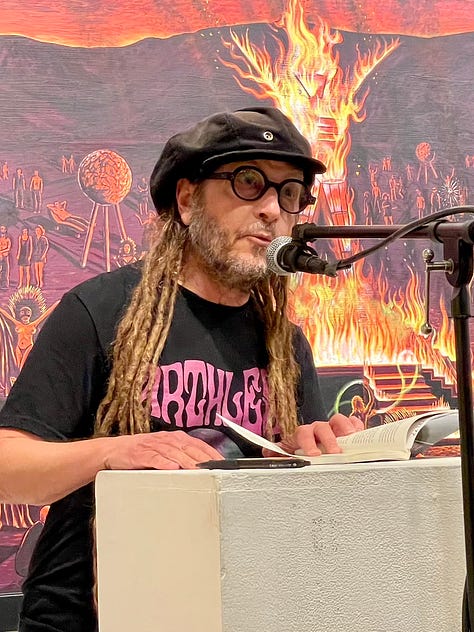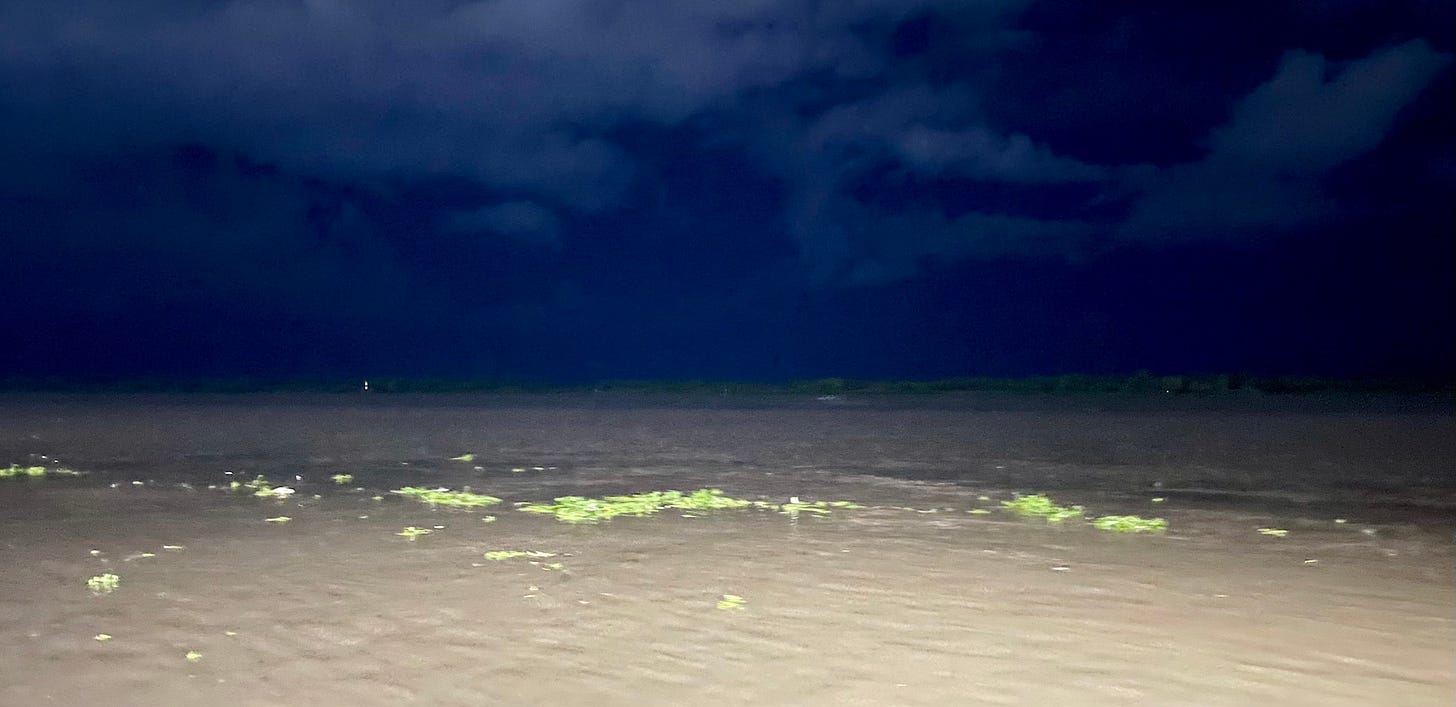I’m back in San Diego and it feels great to be home. Since the last edition of Message from the Underworld, I’ve flown from Barranquilla to Medellin, gotten a tattoo, flown home with a layover in Mexico City, drove up to LA and back, and sat on a panel at the American Library Association conference at the San Diego Convention Center. After all that, I thought I was going to get destroyed during my first session back at the House of Boxing in more than two weeks, but it felt great to put the gloves on again.
Every trip is different but this one was especially challenging because it involved a lot of to-ing and fro-ing (side trips, changing hotels, etc.) and I had several deadlines to manage. I felt like I was constantly juggling differences in time zones, unstable internet connections, and uncertainty about all sorts of things, but I’m happy to say that everything worked out just fine.
For instance, check out this interview I did for the LA Times Book Club newsletter with Megan McDowell, who has translated many of my favorite books of the last few years, including Mariana Enriquez’s Our Share of Night, Samanta Schweblin’s Fever Dream, and pretty much everything by Alejandro Zambra. Here she is on José Donoso, whom I wrote about last week:
What’s your advice for English-language readers tackling your unabridged translation of The Obscene Bird of Night?
Be open to the experience. Don’t expect the different parts to fit together on a totally logical level — they do fit together, but in a nightmarish, intuitive way. Being an active reader with this novel means letting yourself be carried along on its current and being open to feeling what it inspires you to feel.
This is also great advice for traveling. In Barranquilla, which is a port town, I was struck by how the city’s infrastructure worked—especially when it didn’t. It’s the rainy season, which means heavy thunderstorms. Taxi drivers took unusual detours to avoid roads that were at risk of flooding. There was one road on the way to airport that was always backed up because it was in such disrepair: a dirt road in the middle of the city with massive potholes. The driver explained that this stretch of road bordered two municipalities and neither could agree whose responsibility it was to fix it—so neither did.
On our last night in Barranquilla, we went to see the statue of Shakira on the malecón, but the highlight for me was the Magdalena River: a wide, fast-moving, greenish brown river that empties into the Atlantic. The river is so vast we couldn’t see the other side save for the twinkling of lights on the distant shore. The river appears sluggish but the clumps of vegetation on the surface went by at a remarkably fast clip. The river’s deceptive calm has led to many drownings and, according to local legend, things that go missing in the river, indeed all of Barranquilla—bodies, marriages, political careers—all tend to washed up at a same beach on the other side. It’s dangerously polluted and full of turtles and caimans—a lizard that’s a cross between an alligator and a crocodile. I took one look at this river, and as lightning flashed in the distance, I felt FEAR.
Maybe McDowell’s advice to let “yourself be carried along by the current” isn’t such a hot idea after all.
During the flight home, I read Alejandro Zambra’s short story “Thank You” and it really did a number on me. The story concerns a cohort of writers from all over the Americas on a fellowship in Mexico City. Two of the writers, a Chilean and an Argentinian, have coupled but are trying to keep it a secret from the others for reasons they can’t really explain. They hail a cab in the street and are promptly kidnapped. You can read the story here.
I think I knew that it was a bad idea to hail a cab from the street in Mexico City, but I had forgotten—just like the narrator of the story had. The scary thing is I considered doing just that last December when I was by myself on an extended layover. In Santiago last year, Nuvia’s colleagues in an affluent suburb expressed concern that I was walking around downtown by myself, but I shrugged them off. In truth, felt safer there than in many capitals in Europe, but that safety—in Santiago, Sitges, or San Diego—was illusory.
For instance, last weekend here in San Diego a group of teenagers stabbed a couple in Pacific Beach, a place that only a small percentage of people who have ever walked the earth can afford to own a home.
Being a confident traveler is like being a political extremist: it can warp your thinking until you become the opposite of what you think you are. In other words, overconfidence is akin to cluelessness. I don’t know what I’m getting at exactly, but reading “Thank You” shook me. It was like looking into the murky Magdalena and it will be interesting to see what surfaces...
Work-in-progress update
When I’m working on a book I keep track of my daily word count and make note of my overall progress relative to everything from where I am in the book to what’s going on in my life. None of it means anything, but it’s a way to keep myself accountable to the dream of the novel until I get a draft done—at which point I never look at those numbers again. Still, it’s especially helpful when there’s a lot going on, which is always the case when I’m traveling. It’s a way to keep up my routine even when I’m physically deviating from it.
I say this as a preamble to the following: I wrote about 15,000 words during my travels and the novel sailed past the 100,000 word mark, which is somewhat alarming since I’m nowhere near the end. Most importantly, I had a big breakthrough and figured out the mystery at the heart of the book, which feels significant. I wrote a scene in the form of an interview transcript and that unlocked all kinds of things I didn’t know about the novel.
Feelings… numbers… formatting experiments… none of it means anything, but I’m happy to say I’m making progress. I’ll be home for most of the rest of the summer and hope to make significant progress in the next two months.
Running with the Devil
Less than 24 hours after returning from Colombia I drove up to LA for the launch of the late John Albert’s new book: Running with the Devil. I wrote about the event for the LA Times, and I urge you to check it out. Here’s an excerpt with a quote from Joe Donnelly, who edited the book:
Albert had a knack for writing about things that had been overlooked or pushed to the margins, and by training his lens on them helped make them culturally significant again. In a city that runs on hype, Albert was more interested in those who’d opted out, been left behind or were kicked to the curb by the dream factory.
“He was a throwback,” Donnelly said, “a punk-rock George Plimpton. He was in the mix of life and wrote from the perspective of lived experience, and not just helicoptering into an anthropological survey of something. He actually knew of what he spoke.”
I didn’t know John well but I liked him a lot. I met him while I was working on Do What You Want. I interviewed him about his time in the band and learned that he and Brett Gurewitz were still close.
Before I met John and learned of his affiliation with Bad Religion, I knew him as a writer. When I lived in LA and went to a lot of readings I saw him read. I knew he was part of the crew of writers whose work appeared in Joe Donnelly’s literary magazine Slake alongside people like Jerry Stahl and Amy Bender. I thought they were all so cool.



A lot of those people were in the room on Sunday afternoon to celebrate John. There were punk legends like Brett Gurewitz and Keith Morris and Jennifer Finch. There were literary lions like Jerry and Bucky Sinister and Rich Ferguson. There were people with a foot in both worlds like Iris Berry and Allan MacDonnell. There were people who have been documenting LA for decades like Joe Donnelly, Arty Nelson, Steve Appleford, and Gary Leonard. And there were people from John’s inner circle like his son Ravi, his brother Jesse, and his friends John Waldman, Justin Warfield, and Ben Harper. There were even a few people I’ve gotten to know through this newsletter (Hi Devon & Cassius!).
It was such an uplifting experience to hear people read John’s words and share stories about him. It’s the kind of send-off that any artist would be grateful to have. I’m glad I was there not only to witness such a profound farewell, but to participate in the beginning of his book that is certain to find plenty of readers new and old. I urge you to pick up a copy.
Thanks for reading. If you’re a new subscriber, thanks for being here; and if you recently upgraded to a paid subscription, you’re the best.
If you liked this newsletter you might also like my latest novel Make It Stop, or the paperback edition of Corporate Rock Sucks: The Rise & Fall of SST Records, or my book with Bad Religion, or my book with Keith Morris. I have more books and zines for sale here. Message from the Underworld comes out every Wednesday and is always available for free, but paid subscribers also get Orca Alert! on most Sundays. It’s a weekly round-up of links about art, culture, crime, and killer whales.




I was there but it was too packed I didn’t see any of the speakers but at least I picked up the book and bumped into Keith again.
It became a bit of a running joke to me that whenever I would go to Santiago, regardless of the barrio, someone would always tell me “Be careful, it’s really dangerous there”. In spite of all this, I never felt in danger, but keeping your head on a swivel is always the smartest thing to do. I was gonna end that sentence with “while traveling” but, well, this is the world we live in. Glad to hear you are enjoying Zambra!